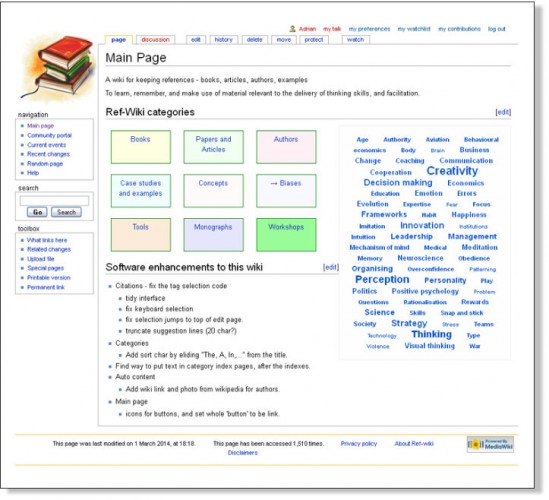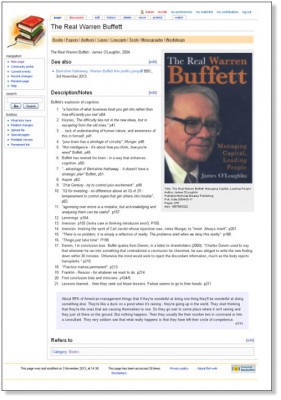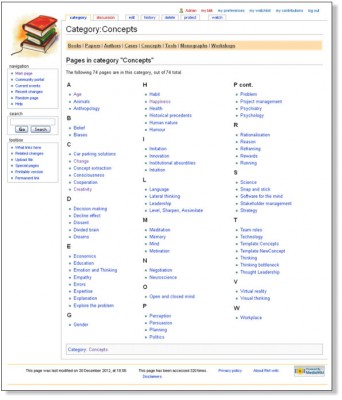Have you had the experience of remembering something you read, but you can’t remember where you read it or what the important details were? And worse, you then spend ages trying to find it again? Or do you get great ideas when you’re out and about, or distracted, that you can’t recall later on? Isn’t it fascinating how much we come up with, or come across that seems so useful, inspiring, and interesting which is then lost to us forever, slipping through our fingers. Sometimes it seems like ideas come when we’re not “looking” and the moment we try to look for them they go away – like looking at dim stars at night.
Why should that be important? After all, we can’t remember everything and probably wouldn’t want to. It’s important because later when we really want ideas – for writing reports or articles, things to pursue or make better, ways to do our jobs, new markets, products, research… our minds go blank, and all we can think of is doing the most obvious thing like we did last time.
Because of this, we come to believe we can’t make new and interesting contributions, or see opportunities for positive change at the time when we most need them to act upon them. Imagine all the ideas and thoughts you have over a year, or decades, that are ‘lost’ – it’s an extraordinarily rich repository to draw upon. If you agree with that view, then you’ll agree that we do have plenty of ideas and interesting things to offer…it’s just that only a small fraction of them are available to us when we really need them.
Perfect Memory
If you think it would be useful to have more of your storehouse of ideas and experiences available to you, then what can be done to make that happen? Memory is one route. There are great techniques that take a bit of practice. Some people do have the most extraordinary memories [1] which implies that the human brain is indeed capable of much more. Few people get taught memory techniques – so there’s plenty to gain, and that’s surely valuable. Yet that does seems like work: is there an easier way? Taking notes surely helps – writing was a great invention. The problem is will we ever find those notes again – probably not. To make a real difference we need a way of noting what’s important, and ensuring it’s readily available when we need it. Without both of those parts working well, it’s more likely to just add to the frustration.
Technology to the rescue? – perhaps
Like many people, I seem to get my best ideas or insights in inconvenient places: showers; running; driving… and by the time I get to write them down they’re gone. (Darwin noted that if he didn’t write down an idea that challenged his views, within half an hour, his mind would work to reject the memory of it, much as the body rejects transplants) [2].
Solutions that make it easier to capture ideas before they’re lost don’t have to be high-tech. A scuba-diver’s waterproof notebook is great for baths or for when you’re out running, or diving come to that. But it only helps with the important task of ‘capturing’ ideas. It’s no help for making them available when needed later – you’ll just end up with piles of inaccessible notes. The access problem is a bit harder. In this case technology really can come to the rescue. There are plenty of applications offering to help you capture anything you like – images, pdf’s, cuts/paste’s from ebooks – and store them for you for searching later. The problem for me is that when I use them I end up with an indiscriminate morass of stuff I don’t seem able to make sense of. Some more discipline is needed. A key question when it comes to technology isn’t “can it do x” (it nearly always ‘can’) – instead the question should be “how easy does it make it to do x”. [3]
Lost worlds reclaimed – some personal progress
So what is needed to make recalling anything we’ve captured easy, in the way I’m thinking of? Your mileage may vary depending on your preferences, but for me the job to be done is that of decanting new ideas into something best described as a continually growing “encyclopedia” of my own thoughts and encounters that matter to me. Happily the Free Software community, which I happen to like, has a well tested beast for this. It’s best known use is for the big public encyclopedia with 30 million articles in 287 languages, and tens of thousands of contributors. You’d surely think that the same software will be capable of maintaining an encyclopedic collection of personal ideas and inspirations that you want to remember – or at least it’s a great start to finding out what works.
There are surely other ways to do it, but it’s good to start somewhere, so here’s where I’ve got to with using this promising platform for the specific goal of making interesting ideas we have, or come across, available to us when we want them. [4].
 It takes a little thinking to use the categories, tags and pages of an encyclopedia to capture the kinds of ideas you have, but not too much thinking. Something designed to have thousands of authors surely copes well with the evolving fuzziness that’s going to be part of this experience.
It takes a little thinking to use the categories, tags and pages of an encyclopedia to capture the kinds of ideas you have, but not too much thinking. Something designed to have thousands of authors surely copes well with the evolving fuzziness that’s going to be part of this experience.
 How do I make use of this? Whenever I come across something I want to remember, I add it in. With books for example, I prefer to make brief notes in the back, then type them up roughly.
How do I make use of this? Whenever I come across something I want to remember, I add it in. With books for example, I prefer to make brief notes in the back, then type them up roughly.
A key point we can confirm, is that the physical act of making notes, albeit brief notes, is what makes the points stick in your mind. [5] It’s a key part of making the process effective for you. Just cutting and pasting “everything” means you don’t get to think about it along the way. And because pictures make more of an impact in memory, if you fancy adapting the software, you can get it to fetch the book picture and details from, say Amazon, as happens here. It’s magical how pulling in pictures automatically makes this psychologically effective – a big reward for little effort.
 Now the neat thing, is that if I’m having ideas about the concept of “creativity”, for example, I can throw my ideas onto a page, but can leave them there and only need to tidy them up when I want to make use of them – they are all exactly there when I want them.
Now the neat thing, is that if I’m having ideas about the concept of “creativity”, for example, I can throw my ideas onto a page, but can leave them there and only need to tidy them up when I want to make use of them – they are all exactly there when I want them.
Solving the Conundrum
Anything that comes to your mind that’s worth you wanting to keep – things read, ideas had – can be offloaded into your own version of what might be the world’s best encyclopedia builder, and they really do become available when you next need them (I couldn’t remember where I’d come across that Darwin quote above for example, but found it magically – something which previously would have definitely taken far longer looking through books). For me it solves the conundrum. How wonderful is that! Depending on the work you do and your interests and lifestyle, it may work wonders for you too.
Finally, there’s another reason why remembering where your key ideas came from, is important. Too often, our beliefs are based on half-remembered things we’ve seen or read, which accumulate to take on importance in our minds, typically aligned with our prejudices. We end up arguing for them, when we can’t remember where the ideas came from, or why we believe them – we just “do”. If we could remember, we could go back and check out what we’re saying, and why we came to believe it – at least for some of the important things. Half the time you’ll find it was some bloke in a pub, or a journalist on a mission to sell a story, or an academic with their own career agenda biasing what they present. So if you can remember your sources, you can check them out more carefully. It can be surprising to rediscover where your beliefs come from and on what evidence they are actually based. And if we want a better Thinking Utopia (well, why not?), then that’s going to be a key part of our practice.
Adrian West
References and Notes
1. Luria, A.R (Aleksandr Romanovich): The Mind of a Mnemonist: A Little Book about a Vast Memory, 1968
2. Warren Buffett: Letter to Shareholders (2000).
3. There’s a theorem in computer science known as “turing completeness“. In essence it says that all (normal) computers are ‘equivalent’ in terms of that they ‘can’ compute. Like hammering nails in with your fists, you ‘can’ but a hammer makes it ‘easier’.
4. I installed the Mediawiki software on a private server – it’s nice to have your own data on your own server with your own (i.e. Free) software, don’t you think? It means you’re less vulnerable to the whims of providers and software companies, which is important if you’re aiming to invest your effort for the long term. But there are plenty of ways to try out Mediawiki if you wish to. If you have a website and a hosting provider, they usually offer this, or try typing “Mediawiki hosting” into a search engine and see what comes up. An alternative would be WordPress, which also offers some excellent facilities, though isn’t as purposed towards being an “encyclopedia”.
5. Howe, M.J.A.: “Using students’ notes to examine the role of the individual learner in acquiring meaningful subject matter“, Journal of Educational Research, 64, 61-3.
